

Investors drop Brazil meat giant JBS. The investment arm of northern Europe’s largest financial services group has dropped JBS, the world’s biggest meat processer, from its portfolio.
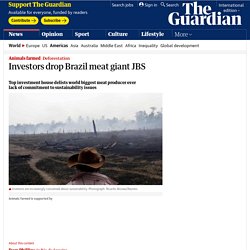
The Brazilian company is now excluded from assets sold by Nordea Asset Management, which controls a €230bn (£210bn) fund, according to Eric Pedersen, its head of responsible investments. 1.9 billion people at risk from mountain water shortages, study shows. A quarter of the world’s population are at risk of water supply problems as mountain glaciers, snow-packs and alpine lakes are run down by global heating and rising demand, according to an international study.
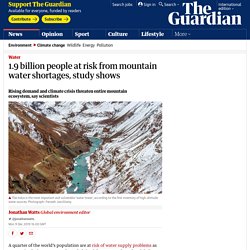
Sustainable Development Solutions Network. Is inequality bad for the environment? That equality matters in terms of health and happiness has been clear for some years.
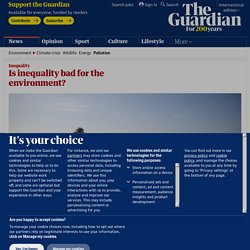
But it is also better for the environment. The evidence (which is still emerging) suggests the most unequal affluent countries contribute more to climate change via pollution than their more equal counterparts. The destruction of the Earth is a crime. It should be prosecuted. Why do we wait until someone has passed away before we honour them?
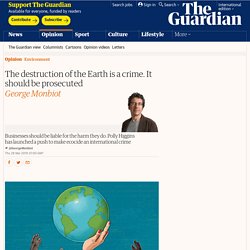
I believe we should overcome our embarrassment, and say it while they are with us. In this spirit, I want to tell you about the world-changing work of Polly Higgins. She is a barrister who has devoted her life to creating an international crime of ecocide. This means serious damage to, or destruction of, the natural world and the Earth’s systems. It would make the people who commission it – such as chief executives and government ministers – criminally liable for the harm they do to others, while creating a legal duty of care for life on Earth. I believe it would change everything. Explainer: what dust from the Sahara does to you and the planet. At this time of year in Europe, you may have noticed something in the air.

Dust-laden winds blowing from the Sahara desert cause “seasonal haze episodes” that can even result in mud or “blood” rain. In West Africa, which experiences haze episodes between November and March, the dust-laden trade wind is called the Harmattan and has important implications, not only for soil fertility but also radio communication, visibility at airports and in shipping lanes, and also on livelihoods – and health. Dry skin and cracked lips are regular symptoms of exposure to the haze. But it presents more serious problems for asthmatics – and can lead to silicosis, a lung disease caused due to a high content of quartz in the dust. In some areas the dust blocks the sunlight enough to make temperatures drop significantly. Hard living: what does concrete do to our bodies? Michael has worked with concrete for 27 years.
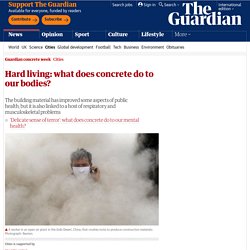
'We're wholly disappointed': the industry responds to Guardian concrete week. This week Guardian Cities is investigating the impact of concrete, revealing the terrible destruction it causes to the planet: • Concrete is responsible for up to 8% of the world’s emissions of carbon dioxide, more than any material after fossil fuels. • Concrete in cities exacerbates flooding that kills thousands of people every year. • Its dust can be toxic. • It uses a tremendous amount of fresh water, roughly 10% of the global supply, often in communities where water for irrigation is in short supply. • It contributes to the heat island effect, raising temperatures in some already dangerously hot cities.
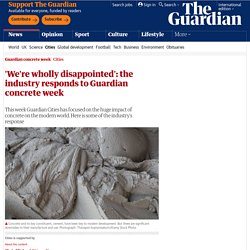
Contribute to a podcast on how we can make fashion more sustainable. In the next episode of our We Need to Talk About podcast, we’ll be exploring how an individual can rethink their relationship to clothes and make easy choices towards sustainable shopping.
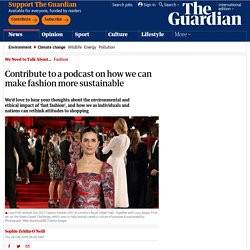
We’ll be looking at the psychological cycles of buying, as well as the changes that need to come from government level. We want to gather questions from readers and supporters who are experts in related fields, but also those who have personal experiences or reflections to share. In particular we’re looking for positive solutions-based ideas about how we can improve the situation. Lucy Siegle, MP Mary Creagh, and others will be discussing this issue in our next recording. To share your questions, reflections and ideas with them, please email us at: weneedtotalkabout@guardian.co.uk … providing your question along with your name, age, and country of residence. The fashion industry is big business. Concrete is tipping us into climate catastrophe. It's payback time. Tucked away in volume three of the technical data for Britain’s £53bn high speed rail project is a table that shows 20m tonnes of concrete will have to be poured to build the requisite 105 miles of track, culverts, bridges and tunnels.
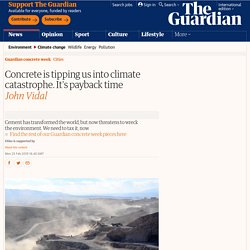
It is enough, it has been calculated, to pave over the entire city of Manchester. A more modest 3 million tonnes of concrete will be needed to construct the Hinckley B nuclear power station in Somerset, and the proposed new runway at Heathrow will require one million tonnes. Cement, the key component of concrete and one of the most widely used manmade materials, is now the cornerstone of global construction. It has shaped the modern environment, but its production has a massive footprint that neither the industry nor governments have been willing to address. Concrete: the most destructive material on Earth. Climate and economic risks 'threaten 2008-style systemic collapse'
The gathering storm of human-caused threats to climate, nature and economy pose a danger of systemic collapse comparable to the 2008 financial crisis, according to a new report that calls for urgent and radical reform to protect political and social systems.
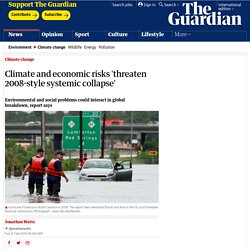
The study says the combination of global warming, soil infertility, pollinator loss, chemical leaching and ocean acidification is creating a “new domain of risk”, which is hugely underestimated by policymakers even though it may pose the greatest threat in human history. Earth's resources consumed in ever greater destructive volumes. Humanity is devouring our planet’s resources in increasingly destructive volumes, according to a new study that reveals we have consumed a year’s worth of carbon, food, water, fibre, land and timber in a record 212 days. As a result, the Earth Overshoot Day – which marks the point at which consumption exceeds the capacity of nature to regenerate – has moved forward two days to 1 August, the earliest date ever recorded.
To maintain our current appetite for resources, we would need the equivalent of 1.7 Earths, according to Global Footprint Network, an international research organisation that makes an annual assessment of how far humankind is falling into ecological debt. The overshoot began in the 1970s, when rising populations and increasing average demands pushed consumption beyond a sustainable level.